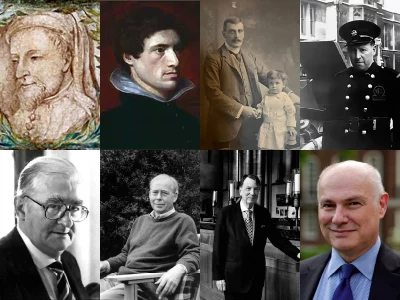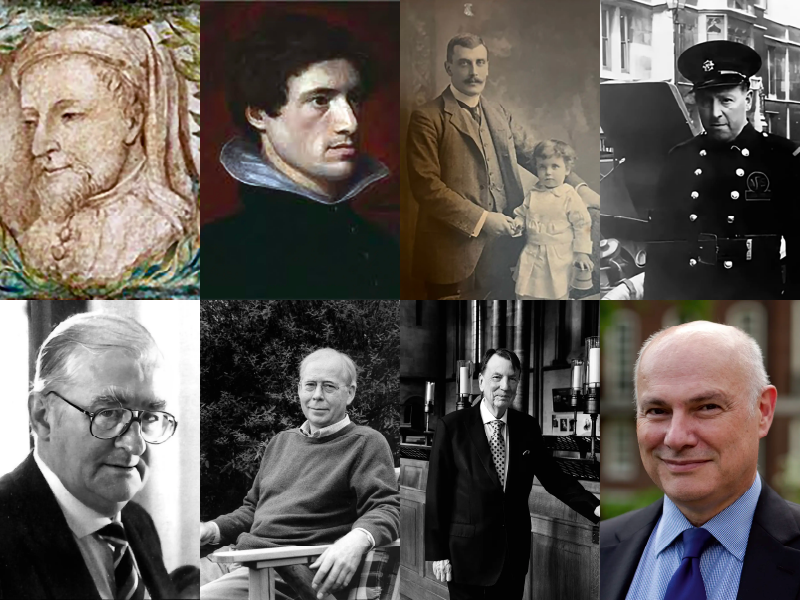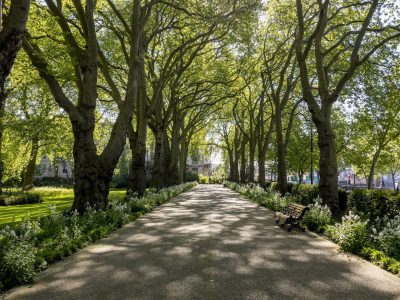

Sub-Treasurers of the Inner Temple
Based on a much longer talk to the History Society in May 2024.
The distant origin of the role of the Sub-Treasurer (ST) of Inner Temple is not unknown. Geoffrey Chaucer, claimed dubiously to be a member of the Inn, wrote in the late 14th century – roughly when we have the first written evidence for The Inner and Middle Temples – of a “gentle Manciple”. My progenitor was a pilgrim in The Canterbury Tales.
Chaucer refers to the Manciple coming from “a temple”, rather than Inner Temple. But we probably had one and, though a caricature, Chaucer may be saying something valid about their reputation. Although uneducated, and working for over 30 masters, intelligent and learned in the law, the Manciple can “outpace” them all (“wipe their eye”) with native cunning. He was particularly adept at dealing with the Achatours, the catering suppliers of their day. He was a professional like the lawyers he serves but working for his own selfish purposes. As we learn, he is vain and pretentious. The adjective “gentle”, meaning well-bred, is of course ironic.
Chaucer only wrote that the Manciple had short hair, like a priest. But the 15th century Ellesmere Manuscript of the Canterbury Tales depicts him as rosy-skinned, with a beard. He looks well-off and we learn he can live frugally and chooses not to give to the poor. We hear too that whether he purchases on cash or credit he always ends up ahead in his accounts, a financial impossibility – the Host of the pilgrims refers sarcastically to “small errors in your reckonings”. He is well observed in a mid-20th century painting by Polish artist Arthur Szyk: the flask the Manciple is holding out indicates hospitality, but he is also extremely well-armed.
Whereas the Manciple had 30 masters, I have some 360 Governing Masters of the Bench or some 600 Benchers in total to ‘outpace’. So where are the similarities between the Manciple and today’s Sub-Treasurer? Well, he bridged the gap between the legal and non-legal worlds, he supported his masters in practical ways, and he derived authority from them and was trusted by them (unwisely in his case).

A “servant of the apprentices of court”, almost certainly in the Temple, is mentioned as early as 1339 in manuscripts, but may have been lowlier than a Manciple. The first references to a Manciple and a Steward appear in the London legal quarter in the 1340s and 1350s, evidence of the establishment of collegiate legal communities at that time. Master John Baker has noted the local coroners’ records of that period might misleadingly suggest the Inns then were “dens of violent students, run by homicidal servants”.
Although the oldest known office in the Inns of Court is probably that of the Manciple, much had changed by Henry VIII’s reign. By then, the permanent domestic establishment consisted of the Steward; the Butler (and under-butlers); the Cook (and kitchen staff); and the Pannierman (or waiter). Later in the 16th century Porters are mentioned, concerned with security and good order, and there was a host of lesser servants (laundresses, lackeys and turnspits etc). The Pannierman blew the horn for dinner: later the Porters took on this role, in return for a pint of beer after every performance.
Sadly, all The Inner Temple administrative records pre-1505 and all financial records pre-1606 are lacking. But the records refer to a Deputy Treasurer as early as 1526 and there are repeated references to such an officer from 1557, either as Sub or Under-Treasurer (both derived from the Latin sub-thesaurius). Why Inner Temple settled eventually on the Sub-Treasurer title, while the other Inns of Court fixed on Under-Treasurer (UT) is a moot point – perhaps we like to be different. The first Sub-Treasurers were appointed ad hoc by Treasurers as debt collection assistants and to audit accounts, and were Benchers effectively acting as Deputy or Vice-Treasurers. The titles clearly derive from times when the financial element of their roles was more prominent, though it still exists in a scaled-back form.
Only in 1682 did the Inn create a ‘standing Sub-Treasurer’ whose duties as then defined were extended later as business increased. It was ordered that the Sub-Treasurer, Steward and Chief Butler should always be appointed by Bench Table and confirmed by a Parliament.

Patrick Maddams and Greg Dorey. Above: The Manciple in the Ellesmere manuscript of Geoffrey Chaucer’s Canterbury Tales.
Since then, the Sub-Treasurer has formally been the Inn’s principal administrative officer. The 1682 decision was probably linked to the fact that prompt payment of Commons had become a serious issue, resulting in occasional seizure of chambers and bonds in suit to recover arrears. The Sub-Treasurer’s terms of reference included receiving and accounting for income; reporting defaulters to Bench Table; and overseeing contracts for work done or goods bought. He also had to provide sureties of £2,000 for his performance, a huge sum of money. For this he received remuneration from various sources, including 5 per cent of all income. It was a complex arrangement and the incentive to ensure student numbers remained high and chambers were filled was considerable.
Anthony Belbin, a member of the Inn, was appointed to this restructured role. He had to attend every Parliament and record decisions; prepare all certificates and warrants of admittances into or out of the Inn; and supervise the Butler’s recording of exercises relating to Call to the Bar. In 1684, he resigned to become third Prothonotary at the Court of Common Pleas – his final disbursements were 15s for wine for Bench Table and a payment to the Master of the Revels for entertainment. In 1687, Bench Table agreed to suspend revels because he was ill and his lodging was near Hall; he died soon after. Thereafter, some eight incumbents of the role died while still in harness, while several resigned due to ill-health.
Not every Sub-Treasurer since Belbin has been prudent. He was succeeded by Thomas Riggs, a member of the Inn appointed as Under Treasurer. That title is then used up until the appointment of Gasgoigne Frederick as Sub-Treasurer in 1768, after which Sub-Treasurer is used consistently. But in 1694 “for all his manifold defaults [Riggs] is discharged from his place”. He was summoned to Bench Table to account for money he owed and various legal proceedings followed. Thereafter, Bench Table appears to have signed off the accounts of all his outgoing successors.
The payment of sureties on appointment continued until the mid-20th century. Essentially, this guaranteed the keeping of true accounts of all income and expenditure and responsibility for the safekeeping of the Inn’s assets – plate, linen, deeds, rolls, admission books etc. The largest such security was required from Francis Richards when he became Sub-Treasurer in 1724 – the payment was of £4,000 (about £1 million in current values), backed by two other people. This reflected the large sums passing through his hands and the fact that until much later investments of the society were made in his name. At the time of his appointment, the Benchers narrowly resolved that in future no petition for the appointment should be entertained that did not come from a member of the Inn admitted before the post had become vacant.
Samuel Salt was the last Under Treasurer and was a Middle Templar when admitted to Inner Temple in 1745; he occupied the post until 1768. He employed John Lamb as his clerk, John (also a waiter in Hall) being the father of Charles Lamb, author of ‘The Old Benchers of The Inner Temple’ in the Essays of Elìa. A line from the Essays features on the boy’s statue in our garden – “Lawyers, I suppose, were children once.” Salt treated the Lambs as family and was called to the Bar in 1753. He resigned to become an MP but continued to serve The Inn in many roles, becoming Treasurer in 1788 before his death in 1792. Master MacKinnon (Treasurer in 1945) observed in one of his essays that it therefore seems unreasonable that Elìa made Salt out as an absent-minded nincompoop, whose business was largely done for him by his shrewd clerk. Lamb’s accuracy, however, is thrown into question by the fact that he thought his own father a fine humorous poet – but as Master MacKinnon put it, “sorrier stuff was never penned.” Lamb was only 17 when Salt died.
Lamb more generously credits a subsequent Sub-Treasurer John Spinks as kindly supplementing his meagre fare when he was a pupil at Christ’s Hospital. Spinks was succeeded by the Librarian Randal Norris in 1801. Norris seems to have been an indifferent Librarian and perhaps an indifferent accountant – after his death an investigation of the Inn’s account revealed large sums due to the Norris estate. He was followed in 1827 by James Gardner, a clerk to Norris, who suffered poor health and domestic problems and failed to carry out his duties properly. When Gardner died in 1833, he left substantial debts through his failure to purchase through the Stamp Office, students’ admission stamps and barristers stamps, for Calls to the Bar. An 1820 map of The Inner Temple estate shows that at that time the Sub-Treasurer’s residence was part of the Treasury Building. In recent years it has been a flat in Paper Buildings.
Throughout the 19th century, those appointed Sub-Treasurer were predominantly the former clerks of their predecessors. In early 1870, however, Bench Table determined that only those people they proposed should be considered for the post. Their next appointment was Henry Hall Dare, whose job description is heavily focused on financial duties and oversight, but also covers the need to take care that the Temple is properly watched and warded, and to conduct all correspondence on the Inn’s business. He was followed in 1888 by one of the more distinguished holders of the office. Henry Waldemar Lawrence was born in Kathmandu in 1845, the son of Brigadier-General Sir Henry Montgomery Lawrence of Siege of Lucknow fame. Our Lawrence was a barrister of Lincoln’s Inn and later a JP for London and Surrey. In 1898, he became 3rd Baronet Lawrence of Lucknow and died in harness in 1908. His references included a glowing account from no less than Lord Napier of Magdala. Other references suggest Lawrence is rather overqualified for the job, though that might mean it was not seen as an illustrious role at that time. He won on a second ballot in Bench Table against the other remaining candidate, Chief Clerk Milton.
Lawrence was succeeded by Walter George Wrangham, with Milton again coming an unfortunate second in the ballot. Wrangham was a barrister before being appointed Sub-Treasurer. During the First World War, he was permitted to work part-time at the Ministries of Munitions and Food. His resignation in 1927 was accepted with regret and sympathy, presumably because he was unwell, and he was awarded a generous pension.
For courage shown by Sub-Treasurers, it would be hard to beat the record of Roy Robinson – our longest-serving incumbent (1927–1958) and previously Chief Clerk. Like many staff he joined the Auxiliary Fire Service during the Second World War and subsequently a separate Fire Guard for night duties at the Temple, where he supervised a joint fire-fighting rota. He and his wife Cecile displayed particular heroism as firewatchers during the worst air raid on the Inn, on 10/11 May 1941, when he sustained a bad gash in the leg but returned to firefighting, limping, after being bandaged. He received an honorary mention in the Inn’s records for bravery.
Salaries of Sub-Treasurers were remarkably stable between the complex arrangements made for Belbin, up to the late 20th century. Salt was paid a salary of £100. When Norris was appointed, it was recorded that “…every stipend, salary, allowance or emolument enjoyed by the Sub-Treasurer do cease and in lieu a salary of £300 per annum be paid”. He was also allowed a set of chambers and office space for free; had a grant towards employing a clerk; and received fees on admittances and certificates granted. In the late 20th century salary increases accelerated – possibly alongside the introduction of rents more closely aligned with the market. From time to time, there were also monetary gifts for special services, bonuses, gratuities and upon retirement, and for pensions and widows’ pensions. A proper superannuation scheme was in place by the time Robinson was Sub-Treasurer.
Until the late 20th century, Sub-Treasurers personally interviewed prospective new members before they were admitted to Inner Temple, to see if they were fit and proper persons. The most notorious interviewer was Commander Rodney Flynn. Master Peter Birkett has described his own somewhat confrontational admission interview with Flynn in a Yearbook article (2019–20). Other commentators describe hearing racist attitudes at such interviews, as well as advice to non-Muslims to sit next to Muslims at dinner so you could drink their port as well. In an oral history interview a member of Inner remarks that Flynn “…certainly didn’t approve of women at the Bar…”.
You did not want to be a student in trouble with the Sub-Treasurers in those days, up to 70 years ago. Times have changed, though my predecessor Patrick Maddams once told an interviewer that “I do, however, occasionally offer people advice. This is when you are not quite formally reprimanded. Somebody said to me they would rather have paid a £300 fine than have a word of advice from me”. Flynn was a tough man in other contexts too. In 1978, he wrote to the Under Treasurer of Middle Temple to thank him for an invitation to an Amity Dinner: “As a matter of record…I think I should point out that there is no ‘Amity’ between us…. Our only official Amity is with Gray’s Inn.”
I am indebted to Master Elizabeth Butler-Sloss (Treasurer, 1998) for the story of the driver whose car overshot the Inner Temple carpark and was upended in a lightwell. Commander Flynn merely passed by, commenting “that will cost a pretty penny”. When he subsequently crashed his car into the Inn’s red post box (there was apparently more than one such occasion) a crowd swiftly gathered – a Bencher present observed “that will cost a pretty penny”. It is recorded that Flynn was rescued by a former Lord Chancellor.
In his copious diaries, Master Monier-Williams (Treasurer, 1988) noted mournfully in 1976 that “Sadly the passing years have brought out a rather unpleasant ‘quarter deck’ attitude in my old friend Rodney Flynn…which has manifested itself in shortness of temper and lack of tact. This has made him unpopular with Bench, Bar and students. Sad because he has done much for the Inn…the welcome which students are given when they come to the Treasury to join the Inn leaves a lot to be desired”. In 1985, he concluded that 20 years was too long to be in situ as any Chief Executive. He wrote this following a farewell dinner for Rear-Admiral Tom Homan – Flynn’s successor – who he claimed, “brought with him a totally different, friendly approach and we shall miss him”. He had given some seven years of “wonderful service”. In 1977, Monier-Williams had attended the Bench Table that made the appointment. The Treasurer, Master Nield, had announced the unanimous decision and commented that “he went to Grammar School but passed by special examination into the Royal Navy”. Monier-Williams wondered whether “Master Treasurer was apologising or recommending him by the conjunctive use of the word ‘but’ ”.
Between the appointment of Flynn in 1958 and the retirement of Brigadier Peter Little in 2005, the Sub-Treasurers were all retired senior military men (the others being Homan and Captain Paddy Sheehan). This was also true of the other Inns – it was only in 2005 that the appointment of Patrick Maddams turned Inner Temple into what he called a “demilitarised zone”. The others followed suit (Middle Temple in 2011 and Lincoln’s Inn in 2012) except for Gray’s Inn which has stuck with a military appointee. Middle Temple recently remilitarised their Under-Treasurer.
As Treasurer, Master Evelyn Monier-Williams refers repeatedly to conflict with Captain Sheehan. “One of my main concerns during my Readership and Treasurership was the growth of a powerful bureaucracy consisting of the Sub- and Under Treasurers (S/UTs) of the Inns, working in collusion with the General Secretary of the Bar. These were on the main retired service officers and both individually and collectively they had strong ideas as to how the Inns should be run… these ideas did not always tally with the views of the Treasurer of the day whose duty it was to reflect the policy of the Bench. I myself came into conflict with the bureaucracy on more than one occasion, but I made sure that I as Treasurer representing the Bench of the Inn should have the final say.”
Master Monier-Williams mentions the “sinister development” of the four S/UTs meeting monthly, initiating policy and adopting a ‘divide and rule’ approach to getting it ‘rubber stamped’. He comments “Sheehan is an excellent administrator…but he does take the view that Treasurers should reign but not rule. Before we know where we are, decision-making in the Inns will be in the hands of our Chief Executives presiding over a small cabal of their own favourites”. He was especially affronted at attempts to reduce the amount of student dining required, mentioning “gross disloyalty” and “obsessional hostility”.
But the most acute clash came when “The Sub-Treasurer has produced some extremely foul white wine – very sour and with a nasty taste. He really should know better! Adding insult to injury we have stuck our own label on it. Adding further insult to injury it has been served to the Bench! … This really was a ‘try on’ by the Sub-Treasurer in the interests of economy. It was a piece of impertinence and poor service…”. But the Master of the Cellar had the obvious solution: “…it can probably be used on student dining nights…”.
Monier-Williams explained the problem as follows: “In the old days the S/UT had quite an easy job to do. He had a small staff and life in the Inn Treasury was a somewhat leisurely affair. Now the complex business of running an Inn demands quite a different kind of person. We tend to get ex-Service Officers of high calibre and they become impatient with subordinate roles. At the same time life at the Bar and on the Judicial Bench is becoming more demanding. In the result, more and more power passes from the Benches, who are the governing bodies, to a salaried employee…we must be vigilant.”
If there is a theme to the current century, it is that the role of Sub-Treasurer has become yet more complex and multi-dimensional. There is a far greater emphasis on efficiency, effectiveness and governance according to best practice and projects have had to become more imaginative. Peter Little presided over the Millennium and Golden Jubilee celebrations, Treasury Office and kitchen refurbishments amongst much else. Patrick Maddams oversaw the return of the Inn to a more serious and professional education and training function and played a major role in conceiving of and working up to Project Pegasus, the Inn’s refurbishment and redevelopment project.
By modern Acts of Parliament, the Sub-Treasurer and Under Treasurer of Middle Temple have been assigned many of the functions of a local authority, deriving from “ancient custom”. But today we are only responsible for environmental protection, licensing, paving and lighting, public health and safety, refuse collection and water supply. It follows that we frequently have to respond to round-robin enquiries under the Freedom of Information Act 2000, but only in our capacity as local authorities and not relating to information generated by the Inns as private bodies.
Aside from overseeing the work of the staff, my duties now cover the management, financial administration and forward planning of the Inn, within a framework laid down by Bench Table and the Executive Committee. They include maintaining relations with a variety of relevant institutions and overseas jurisdictions, particularly those in the Common Law world, and working closely with Middle Temple to ensure the smooth running of Temple Church operations. I also, of course, managed both our Covid response and, for several years, have implemented Project Pegasus. I remain the first diplomat to be appointed in any Inn to the role and the only ever Ambassador. Sadly, I am the only extant Sub-Treasurer, the 25th such officer at Inner Temple.
The Sub-Treasurers have been around for centuries. Officers with that title started as assistant debt collectors and evolved into Chief Executives, managing 150 excellent staff and dealing with a hugely varied agenda – from the sublime to the occasionally ridiculous. Over the years they faced civil war, plague, fire, financial crises, air raids and substantial building projects. Some were humble and some grand. But few were as cunning as the Manciple.
For the full version of this lecture:
innertemple.org.uk/subtreasurers
Greg Dorey CVO
Sub-Treasurer
